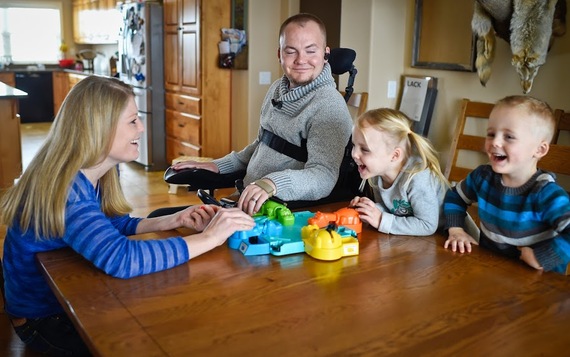Will I be able to start a family and have kids?
Those are the words of a young serviceman traumatically injured in Afghanistan. An improvised explosive device (IED) detonation left him without both legs and with a severely damaged pelvis and abdomen. But his most devastating injury was one few are comfortable discussing - or treating.
This young man, along with thousands more men and women, also suffered severe genitourinary (GU) injuries - injuries that bring with them a host of long-term sexual, fertility, social, and psychological effects that are still not comprehensively understood.
And yet, GU injuries are not uncommon. Between 2005 and 2010, the Joint Theatre Trauma Registry recorded 1,525 such injuries. In 2010, alone, 12.7 percent of all battlefield injuries were recorded as relating to the GU system - a historic high.
Many of these men also suffered traumatic brain injury (TBI), many more lost their legs or arms and damaged vital organs like their colon and intestines. And nearly 65 percent of those who experienced a GU injury also endured severe penile injury or amputation. They return home to face a lifetime of treatment and a long road to recovery - from their physical injuries, from the psychological issues that can cause sexual dysfunction, and from problems with infertility.
Today, as many as 2,000 veterans live with GU injuries that have rendered them unable to conceive a child naturally. The majority of these young men and women - average age, 25 - weren't married when they deployed and did so without considering family planning. Prior to deployment, service members and their partners are not advised about the potential loss of fertility, nor are they encouraged to bank sperm in the event such an injury should occur.
And policy issues only add to their fertility concerns.
Today, in vitro fertilization (IVF) is a widely used - and highly effective - solution for couples struggling to get pregnant naturally. Rooted now in more than thirty years of established medicine, IVF could be the solution injured veterans are looking for.
But IVF is far from cheap. All in all, treatments can cost as much as $50,000 through a private specialist. And while the Department of Defense's TRICARE insurance program offers IVF for certain active duty service members, the Department of Veterans Affairs is barred from providing these services because of an outdated law. For service members with GU injuries who leave active duty and transfer to VA medical care before they are ready to start a family, the possibility of having children may be closed to them forever.
This has to change.
Fortunately, lawmakers and veterans service organizations, led by Wounded Warrior Project, are taking action.
As a result, the U.S. Senate just passed a bill to help provide reproductive assistance for injured service members. Led by Senator Patty Murray (D-Washington), who has fought for IVF coverage for more than five years, the amendment passed the Senate Appropriations Committee in April. It was then brought to the Senate Floor as part of the Military Construction, Veterans Affairs, and Related Agencies Appropriations Act for fiscal year 2017, where it was passed with bipartisan support. It's now up to the House of Representatives to reconcile their versions of the bill and see that this much needed legislation becomes law.
We owe our veterans, who have made unimaginable sacrifices for our country, the opportunity to start a family. It is our duty and our responsibility to make them whole to the extent science will allow. It is unacceptable that we should put our nation's heroes in the position of paying tens of thousands of dollars to regain their basic right of parenthood - a basic right they lost in service to our country.
We are hopeful that with this amendment thousands of injured service members will soon have the opportunity to experience the joy of parenthood. Family is a crucial component of many warriors' recovery processes. We will continue to advocate on the behalf of wounded service members and their families until they have the benefits they have been promised and have so wholly earned.

